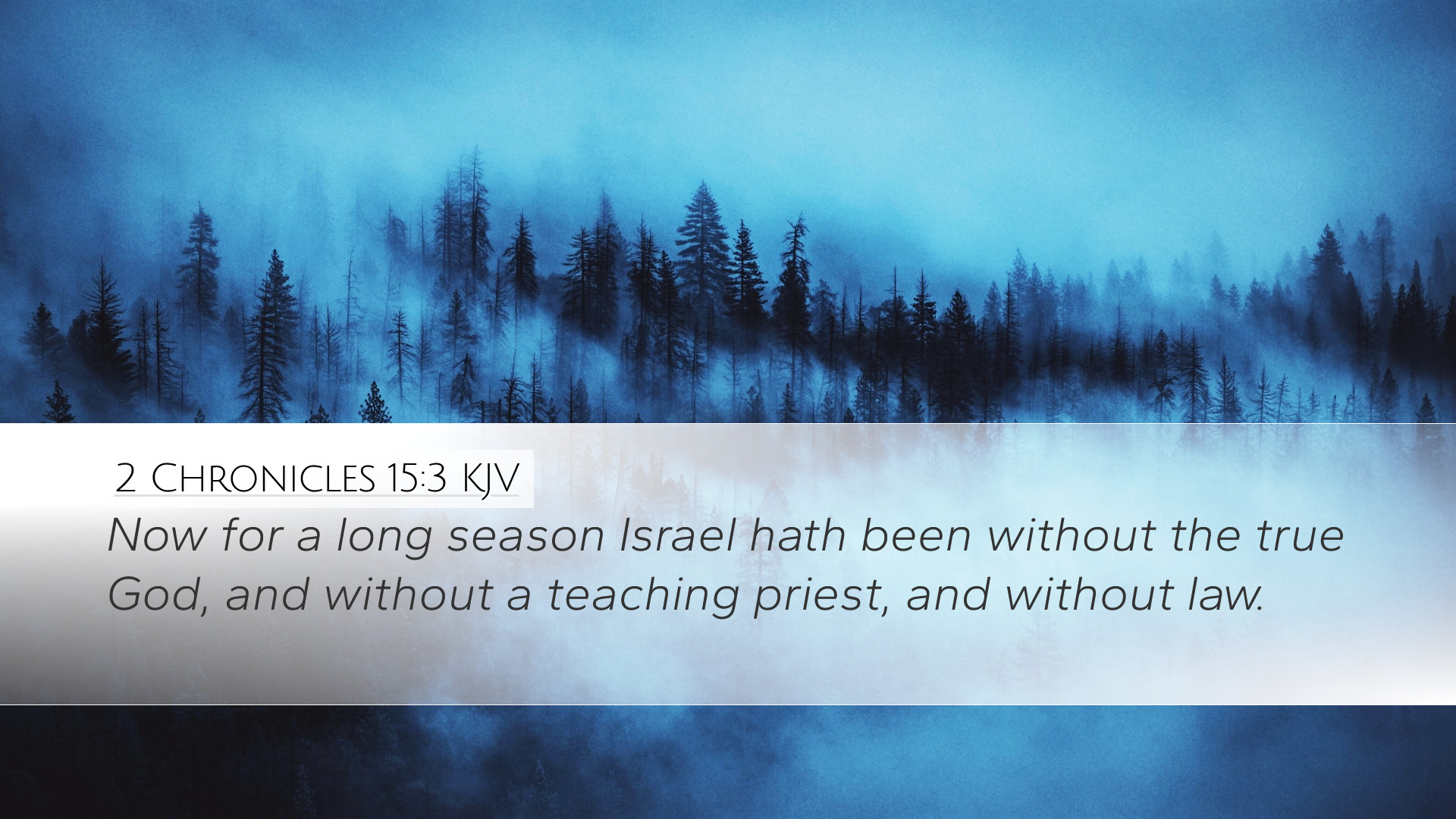Commentary on 2 Chronicles 15:3
Bible Verse: 2 Chronicles 15:3 - "Now for a long season Israel hath been without the true God, and without a teaching priest, and without law."
Introduction
This verse presents a poignant reflection on the spiritual state of Israel prior to the reforms initiated by King Asa. It identifies a period characterized by a lack of genuine worship, spiritual guidance, and adherence to God's law. The insights provided by well-known public domain commentaries offer depth to understanding the implications of this verse for both historical context and spiritual application.
Historical Context
The context of 2 Chronicles 15:3 stems from a time in Israel's history marked by profound spiritual decline. Matthew Henry emphasizes the historical backdrop by noting that Israel had strayed from true worship for many years, leading to a societal and spiritual vacuum.
Albert Barnes notes that this absence of the true God signifies both the neglect of Yahweh and the elevation of false idols, which flourished during the reigns of various kings. This reflects a tragic disconnection from their covenant identity.
Spiritual Implications
The verse highlights three critical deficits in Israel's spiritual life: the absence of the true God, the absence of a teaching priest, and the absence of law.
-
Absence of the True God:
Henry notes that worshiping the true God is foundational to a nation’s spiritual vitality. The neglect of true worship leads to moral and ethical decay.
-
Absence of a Teaching Priest:
In the absence of qualified spiritual leaders, as observed by Adam Clarke, the people lack guidance in understanding and applying God’s truth, resulting in confusion and error.
-
Absence of Law:
No adherence to divine law creates a society that forsakes the principles of justice and righteousness, a point underscored by Barnes who argues that law is essential for social order and spiritual integrity.
Theological Reflections
This verse challenges modern readers to reflect on the vital components of a healthy spiritual community. It invites pastors and theologians to consider the long-term consequences of spiritual neglect.
-
Call to Authentic Worship:
The necessity of worshiping the true God cannot be overstated. When a community drifts into idolatry, as Israel did, it jeopardizes its very existence.
-
Importance of Teaching Leaders:
Clarke emphasizes that the role of the priest, as a teacher of the law, is paramount. Without knowledgeable leaders to instruct and guide, congregations may falter in their understanding of God’s will.
-
Emphasis on Law:
Law is portrayed not just as a set of rules but as a divine institution meant to guide and protect God’s people. Henry notes that without engaging with God’s law, society degenerates into chaos.
Contemporary Application
Modern application of this verse challenges congregations to evaluate their own spiritual condition. Is there a reliance on false idols? Are teaching leaders effectively communicating God’s word? Is there a commitment to living according to divine law?
As noted by Henry, the narrative encourages a move toward revival and reformation—a response to the longing for the true God in a world filled with distractions and false teachings.
Conclusion
2 Chronicles 15:3 serves as a stark reminder of the dangers of spiritual apathy. The insights drawn from Matthew Henry, Albert Barnes, and Adam Clarke converge to illuminate the necessity of true worship, authoritative teaching, and societal adherence to God's law.
The task of church leaders and believers alike is clear: to pursue an authentic relationship with God, to foster strong, godly leadership, and to apply God's law in every aspect of life. Such endeavors will lead to restoration and spiritual health, both individually and collectively.


